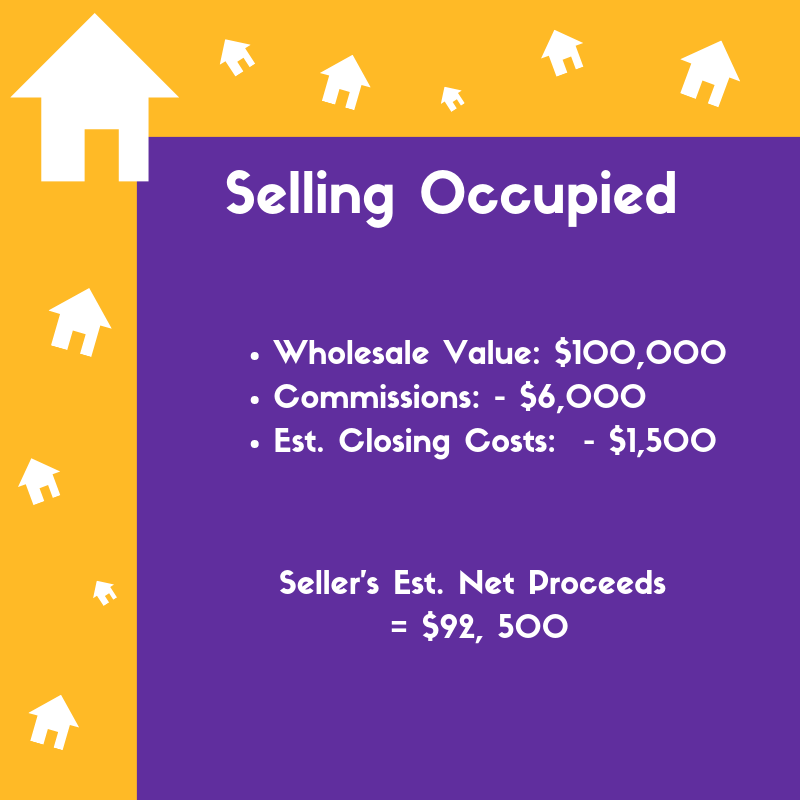While we preach that real estate is a long-term play, sometimes it just makes sense to sell.
Selling, like Buying, is a natural part of the investment cycle.
And, in some cases, it can be a smart move.
As a fully licensed brokerage, we’ve helped many of our Clients in the sale of their rental properties and one of the most frequent questions we get asked is, “should I wait until my Tenant vacates or sell it occupied?”
And the answer is, it all depends.
On what, you may ask?
Well, there are several factors that you need to consider when deciding to sell your rental property occupied or vacant.
Outlined below are some pros and cons for each which will hopefully help you decide the best option for you and your property.
Pros of Selling Your Property Vacant
- The home is easier to show, inspect, etc. – The first and most obvious advantage to selling a property vacant is the ease of access.
There’s no waiting on Tenants to approve showings, no 24-hour advance notice required, no worrying about clutter or messes and the home not showing well.
Anyone can pop in to view the property at any time creating fewer barriers and a higher chance of someone getting an offer submitted more quickly.
Similarly, if you accept an offer, it’s much easier for inspectors, appraisers, and contractors to access the home to conduct any requested services throughout the sales process.
You know the saying, time is money, and the faster you sell your property the more money
you’ll have in your pocket when it’s all said and done.
- Larger pool of prospective buyers – When you sell a property vacant, there are no limitations to who may want the home.
Another investor could have interest in the home, but so could an owner-occupant.
This creates more competition and demand for your property.
Cons of Selling Your Property Vacant
- Vacancy – If you decide to sell your property unoccupied, you will undoubtedly have to suffer through a period of vacancy.
Not only will you have no revenue coming in, you will have to cover the mortgage payment, utilities, lawn care, etc. while your Realtor works to get the home listed.
If the home needs work, it could be 2-4 weeks (or more) to have those items completed depending how much work the property needs.
Once the home is on the market, it could sell in 3 days or 3 months. You need to be prepared for either scenario.
- Make-Ready Costs – When your Tenant moves out and you decide to sell, there will most likely be some make ready work that will need to be completed before you list in order to get the full amount you’re looking for.
You’ll want to work with your Agent and Property Management Company if you have one to determine what the home needs, what costs fall on the Tenant and what will be left for you to cover.
We’ve discussed in a previous blog how condition affects rent rate, and it works the same on the sales side.
There are certain things you will need to do to increase the value and appeal of your property in order to sell it faster and at a higher price.
Pros of Selling Your Property Occupied
- Little to No Make-Ready Work – One perk of selling your property with a Tenant already in place is that you usually don’t have to worry about any make-ready work.
There may be some things that you agree upon during the inspection process, but you won’t have to deal with an entire turnover like you would if you sold it vacant.
- No Vacancy – Perhaps the best part about selling your property occupied, is not having to
worry about vacancy or the costs associated with it.
While you may not get to list the property at a premium price, just think about all of the money you’re saving!
The Tenant continues to cover your expenses throughout the whole sales process, and then you’ll typically just pro-rate any rent to the buyer at closing.
Often times you end up coming out just as well as if you had spent the time and money to sell it vacant.
But again, you’ll want to run the numbers with the help of your Agent to see if that’s the case.
Cons of Selling Your Property Occupied
- Uncooperative Tenants – We’re not making a blanket statement that all Tenants will be uncooperative if you decide to sell. However, it is a VERY real possibility that you need to consider.
We have had several cases in the last year where the Tenants all but sabotaged any chance the Owner had to sell the property.
As the management company, we do everything we can to accommodate the Tenants and make the process as smooth as possible for them, but sometimes that’s just not enough.
You have to remember that they are human beings too and with that comes an element of uncertainty.
- May have to list for less – If you’re going to sell a property Tenant occupied, you have to understand that you have a limited market of potential buyers.
Basically, you’re going to have to sell your property at a value that would makes sense for another investor. Many of the investors we work with look for something close to the 1% rule (Rent rate = 1% of the purchase price).
For example, if your property is currently rented for $1,000/month, a typical investor would only want to pay around $100,000.
Needless to say, you’ll want to make sure your Realtor runs a Comparative Market Analysis for your property so you can determine if selling occupied is the right move.
If a CMA indicates that you could sell your property vacant on the open market for $130,000, it would likely be in your best interest to wait for the Tenants to vacate.
Let’s look at each scenario by the numbers:
- Selling Vacant: As we mentioned earlier, selling a property vacant may bring a higher retail value, but your expenses will also be more. Make-ready costs could vary drastically depending on the work needed. The actual number could be significantly higher or lower than the one we used in this example.
Vacancy costs could include lost rents, utilities, lawn care, etc.
- Selling Occupied: Again, as mentioned above, you may not be able to ask for retail value when selling occupied, but you will have significantly fewer expenses. In the end, it’s very likely that you end of coming out ahead and with much less effort than selling vacant.
The MOST important thing to remember here, is to understand the numbers for your property.
Employ the help of an expert to advise you on the best route to take in regards to selling occupied or vacant before making a decision.
This is something we are happy to help you with.

 you’ll have in your pocket when it’s all said and done.
you’ll have in your pocket when it’s all said and done.  worry about vacancy or the costs associated with it.
worry about vacancy or the costs associated with it.
.png)






